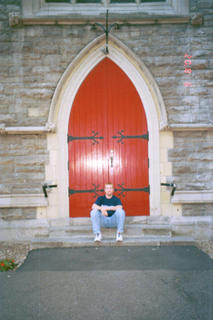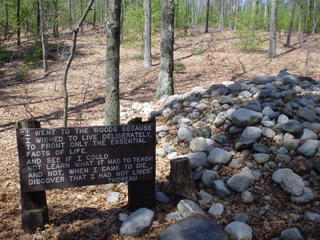Amusing, yes. Confusing, absolutely. How could he not believe in that movie? Granted, it was a pretty outlandish plot, but the basic theme that tornados are destructive forces of nature that need to be better studied should have been completely understood by my father, who experienced this reality at full force. Yet, my father separated himself from not only the movie, but the discussion of such things.
American Christianity has formed its own sub-culture, and has defaulted to this same attitude that my father expressed when confronted with that Jan de Bont film. It is impossible for Christians in America today to not be aware of the progression of the culture in all its different directional tangents (this is often described as a "decline" by many in the Church). But, in their awareness, they have shrunk away like children from their father's cane. "Separation" or "isolation" are becoming more and more the fitting words to describe the Church in America.
I fell victim to this sub-culture, mainly because it is quite deceptive in that, from the outset, it comes across as scriptural. Two of the main passages from the Bible that are cited often to argue that Christians should keep the world at no less than arm's length are 1st John 2:15-17 and Philippians 4:8. And truth be told, the Bible does address the danger of immersing oneself in the world, of taking worldly ways upon oneself. Unfortunately for the sub-culture, never is there mentioned the words "separation" or "isolation." Yet, as a member of this sub-culture from high school through college, I followed the unwritten rules that included: not seeing movies that were R (or, if they were, could have no nudity or sexual references in them - apparently violence and foul language were not as bad); I only read books in the Christian publishing market; I did not support the sinfully promiscuous music industry by purchasing any "secular music;" and of course, weekends never included attendance in any bars, clubs, or questionable parties.
And so, around four years ago, I was crippled by the effects of a massive YAWN. I became so bored - so completely unlike anything I saw in society - that I felt not only very alone, but also extremely ineffective in sharing the love of Jesus Christ with anyone. While many do it everyday (entire children, youth, and college retreats are built around it every summer), I found that separating myself from everything in the world did not make me something special (someone God stood up and applauded) - it only made me excrutiatingly dull. If we were honest with ourselves - with our sinful condition, whether we are Christians or non - I think the idea of God applauding anything having to do with our willpower would be highly laughable. Let's face it, one of the main reasons Christ died is because our willpower to refrain from disobedience is practically non-existent.
But the argument remains, as does the tired youth group-ish question, "Are you "in" the world, "out" of the world, or "of" the world?" (If that confuses anyone, "of" is the bad answer.) And this argument, which is quite intricate and vitally important, I believe, to the future of the Church, boils down to one main thing: Fear. Christians who resign themselves to dwell within this sub-culture (to refrain from the extreme realities of the world, like the recognition of crime, alcohol, drug use, disease, promiscuity, sexual confusion, etc.) might not admit this, but it is not necessarily faithfulness to their clean & tidy God that keeps them in this bubble - it is fear of what exposure to what is outside the bubble might do to them, how it will compromise their purity, mount an assault on their salvation.
I was rescued from the sub-cultural bubble not by any person, so much as a love for good writing and good music and good story-telling, things of which the Christian sub-culture market has little. The first to go was my refusal to read books by non-Christian writers. Being an English major in college, I would have had a difficult time sticking to my guns on that one. In finally opening my mind to both classic and contemporary writers who do not cater to the Christian bubble (though I have found several who are very inspiring Christians), I discovered an exciting new world unfolding before me. But, oh, my reserved sub-culture spirit was sweating nervous bullets ... These days, the music I listen to and the movies I enjoy no longer meet the criteria of the bubble - they meet my own criteria.
Thanks to several in depth conversations that have taken place over the past four months (two big ones in the last three days, actually), I believe I can communicate this sufficiently, at least as far as I'm concerned:
There are two amazing realities in life that determine what I get involved / show interest in. Beauty and Redemption. This stems from my belief in the truth of Scripture, most specifically the Gospel of Christ. I believe God incarnated himself to reveal to humanity these two things. The Creator wanted to show humankind where Beauty could truly be found, and from whence it ultimately originated (in the Creator), and the Creator wanted to make humankind aware of the fact that they are all bent towards Redemption, that every person's "story" is one that is attempting (often struggling) to find redemption (which, according to Scripture, only finds ultimate fulfillment in the overarching, all-sufficient redemption of Jesus on the cross and out of the tomb). Jesus illustrated these two realities in many ways - parables, lessons, sermons, miracles, healings - but none so great as the way he simply spent the days of his life, constantly journeying and surrounding himself with the downtrodden, the dirty, and the despicable (those who, today, would without question dwell outside the bubble). I believe, without a doubt, that Jesus daily spoke of Redemption to them, as well as honestly saw them as Beautiful. He did not allow their degradation or their careless living or their constant rebellion to deter him from spending time with them, being the Light in their darkness.
We strive to be like Jesus, and we continually cite this truth that he hung out with the rejects of society as that which strikingly communicates the boundlessness of his love. But we cannot resemble this love or be like Jesus from our isolated position in the bubble. And because so many do not budge from the sub-culture, the sub-culture is despised (and we shrug this off and quote the scripture that Jesus said the world would hate us). In essence, we are afraid of the world.

I am convinced that the problem with "the world" is not what those who do not know God do, but what those who do know God don't do. Rich Mullins once said, "What amazes me is that God did not come up with any plan B. The Church is it - it is God's hope for the world."
I do not think I am contrary to the verse out of 1st John when I write, "I love the world." I do - I love it. I am a huge fan of it, as well as the One who made it. No, I do not indulge in drugs. No, I am not sexually promiscuous. No, I have never been drunk. In fact, surprisingly, I have found that I am incorrupted by the detriments of the world even though I listen to music by unsaved songwriters, I go and see movies in which drugs are used, crimes are committed, and every once in a while, someone is nude for whatever reason. But, truthfully, I don't see these things. I see a story of determination and bravery, of waking up to the Beauty and wonder of life. I see flawed, hurting characters stumbling through their story, desperate for redemption. And I think to myself, "THIS is real life. THESE are the kind of people to whom I am called to show God's love. THIS is the world - the reality - in which I need to dwell." God knows the bubble is not succeeding in this.
Last night, in a conversation on this very subject, my friend, Grayson, remarked, "I wonder if it is such a bad thing to be 'desensitized.'" He went on to tell a Beautiful story about a short conversation, saturated in grace, that he had with one of the prostitutes that works on his street corner. "I told her 'hello' and asked her how she was and then I just said, 'You look great. You are so beautiful,'" Grayson recalls. "I don't know where that came from, but I know, in that moment, I absolutely meant it. ... I think that is exactly how Jesus saw people." I'm afraid those in the bubble would never be able to experience a grace-giving friendship with the prostitutes on 15th street - they would have moved out of that neighborhood at the first sign of worldliness.
Frederick Buechner writes, "Needless to say, church isn't the only place where the holy happens. Sacramental moments can occur at any moment, at any place, and to anybody. Watching something get born. Making love. A walk on the beach. Somebody coming to see you when you're sick. A meal with people you love. Looking into a stranger's eyes and finding out he's not a stranger. If we weren't as blind as bats, we might see that life itself is sacramental."
I'm new to this, and I do not claim to have just presented the best reflection on this subject. But I think of the book of Proverbs, where Wisdom calls from the streets, to the "naive" and the "fools." She cries for them to bend an ear to her and to come to her in the streets, for, to those who are not afraid to come, she offers understanding, righteousness, and knowledge. She offers herself. She offers the truth of God.


No comments:
Post a Comment